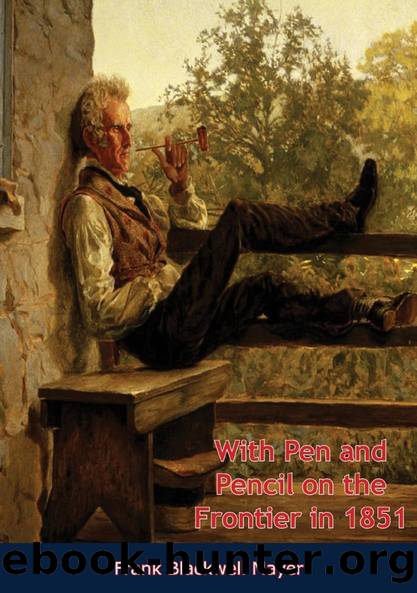With Pen and Pencil on the Frontier in 1851 by Frank Blackwell Mayer

Author:Frank Blackwell Mayer [Mayer, Frank Blackwell]
Language: eng
Format: epub
Google: dIHDjYlNtx8C
Publisher: Minnesota Historical Society
Published: 1932-01-15T04:23:56+00:00
The Indians of the Kaposia band have made but small advances in civilization yet they are among the most sober, honest & best conditioned of their race in the neighborhood of Fort Snelling. Some few have professed Christianity and several are educated, being able to read & write their own language. They were the pupils of the missionaries who have instructed them from books printed in Dacotah for purposes of instruction. The principal portions of the bible & a book of hymns have also been translated into the language and a paper entitle[d] âDacotah Tawaxitkuâ{123} or âthe Dacotah friendâ is now published at St. Pauls edited by the Revd Gideon H. Pond.{124} The word Dacotah, by which name all that nation of Indians called by the French âSiouxâ is designated, signifies a friend or a nation of friendsâsome trans-late it freelyââOne of manyâ.{125}
Five or six young Sioux girls have been taken into the family of Dr. Williamson where they are instructed in their own language & receive the same English education and attention accorded to his children. A teacher has been placed here by [the] government & receives a regular salary but either from want of success in his efforts or inertion on his part there was no school at the time of my visit, althoâ frequent applications are made to Dr. W for admittance to his family.{126} There are difficulties attending a day school, which are obviated in that where the pupils are constantly under the influence of their instructor & his family. Many causes are assigned for the failure of these schools, viz the intrigues of the traders, some of whom consider it their interest to keep the Indians in ignorance{127}the prejudice of the Indians to advancement & the inaction of the teachers. It is difficult to say which or whether all combined is the cause. I heard the children at Dr. Wâs recite & sing & they seemed in all respects equal to the generality of white children, in regard to intellect.{128} Their language is well adapted to Music & the hymns which they sung were far more harmonious in their sound that [than] the English originals, althoâ the Dacotah has not a softened sound in conversation; but is rather harsh & guttural.
I bid farewell to the Doctor, much gratified with my visit & he procured me two Indian women who promised to take me to St. Paul for a âconsideration.â As I entered the canoe he desired me particularly to observe the features of one, & for that purpose I placed myself opposite to herâbut this was a breach of Dacotah etiquette not to be permitted for her gestures & expression soon informed me that I must turn my back on the ladies, & substitute the contemplation of the surrounding scenery & the back of her half-breed son who sat in the bow and assisted the women in navigating our craft. Swiftly sped the light canoe althoâ stemming the current of the impetuous Mississippi now swelled to it[s] largest size.
Download
This site does not store any files on its server. We only index and link to content provided by other sites. Please contact the content providers to delete copyright contents if any and email us, we'll remove relevant links or contents immediately.
The Art of Boudoir Photography: How to Create Stunning Photographs of Women by Christa Meola(18624)
Red Sparrow by Jason Matthews(5471)
Harry Potter 02 & The Chamber Of Secrets (Illustrated) by J.K. Rowling(3676)
In a Sunburned Country by Bill Bryson(3542)
Drawing Cutting Edge Anatomy by Christopher Hart(3526)
Figure Drawing for Artists by Steve Huston(3451)
Harry Potter and the Prisoner of Azkaban (Book 3) by J. K. Rowling(3359)
The Daily Stoic by Holiday Ryan & Hanselman Stephen(3317)
Japanese Design by Patricia J. Graham(3174)
Make Comics Like the Pros by Greg Pak(2917)
The Roots of Romanticism (Second Edition) by Berlin Isaiah Hardy Henry Gray John(2916)
Stacked Decks by The Rotenberg Collection(2883)
Harry Potter and the Deathly Hallows (7) by J.K. Rowling(2724)
Draw-A-Saurus by James Silvani(2718)
Tattoo Art by Doralba Picerno(2667)
On Photography by Susan Sontag(2639)
Churchill by Paul Johnson(2584)
The Daily Stoic by Ryan Holiday & Stephen Hanselman(2574)
Drawing and Painting Birds by Tim Wootton(2510)
